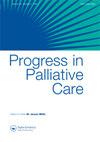姑息治疗中家庭照顾者的幸福体验:一项使用主题分析的定性研究
IF 0.8
Q4 PUBLIC, ENVIRONMENTAL & OCCUPATIONAL HEALTH
引用次数: 0
摘要
家庭照护者在支持临终病人方面发挥着重要作用。虽然为姑息治疗患者提供护理本身就有压力,但家庭护理者有可能同时经历积极的经历和压力。理解这些积极的经历有助于平衡照顾的消极方面。因此,我们采用面对面访谈的半结构化问题进行质性研究,从积极的角度探讨姑息治疗家庭照护者的幸福感体验。整个样本由18名照顾癌症患者的家庭成员和2名照顾运动神经元疾病患者的家庭成员组成。访谈被逐字记录下来,并用定性研究软件NVIVO进行主题分析。结果分析得出的主题是:(1)接受,(2)感恩,(3)希望,(4)幸福,(5)支持。结论5个主题提供了6种独立干预构念。了解这些促进照顾者幸福的主题可以指导我们照顾我们的家庭照顾者。本文章由计算机程序翻译,如有差异,请以英文原文为准。
The experiences of well-being of family caregivers in palliative care: A qualitative study using thematic analysis
Background Family caregivers play an important role in supporting patients at the end of life. Although providing care for palliative care patients can be inherently stressful, it is possible for family caregivers to experience both positive experiences and stress simultaneously. Understanding these positive experiences can be helpful to aid counterbalancing the negative aspect of caregiving. Objective and Methods Therefore, we conducted a qualitative study using face-to-face interviews with semi-structured questions to explore the experiences of well-being of palliative care family caregivers from a positive perspective. The entire sample consisted of 18 family members caring for cancer patients and 2 family members caring for patients with motor neuron disease. The interviews were transcribed verbatim and thematically analyzed with qualitative research software NVIVO. Results The themes generated from the analysis are: (1) Acceptance, (2) Gratitude, (3) Hope, (4) Happiness and (5) Support. Conclusions The 5 themes provide 6 constructs for independent intervention. Understanding these themes that promote caregiver well-being can be a guide for us to take care of our family caregivers.
求助全文
通过发布文献求助,成功后即可免费获取论文全文。
去求助
来源期刊

PROGRESS IN PALLIATIVE CARE
PUBLIC, ENVIRONMENTAL & OCCUPATIONAL HEALTH-
CiteScore
2.60
自引率
11.80%
发文量
24
期刊介绍:
Progress in Palliative Care is a peer reviewed, multidisciplinary journal with an international perspective. It provides a central point of reference for all members of the palliative care community: medical consultants, nurses, hospital support teams, home care teams, hospice directors and administrators, pain centre staff, social workers, chaplains, counsellors, information staff, paramedical staff and self-help groups. The emphasis of the journal is on the rapid exchange of information amongst those working in palliative care. Progress in Palliative Care embraces all aspects of the management of the problems of end-stage disease.
 求助内容:
求助内容: 应助结果提醒方式:
应助结果提醒方式:


